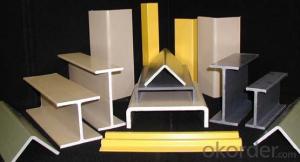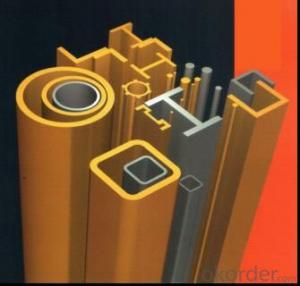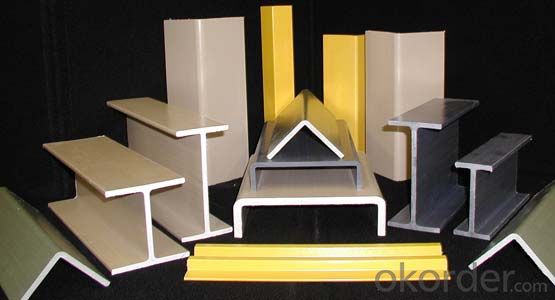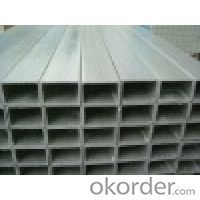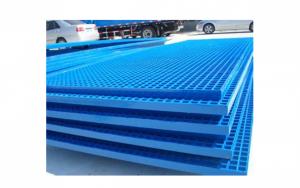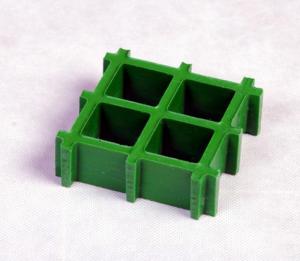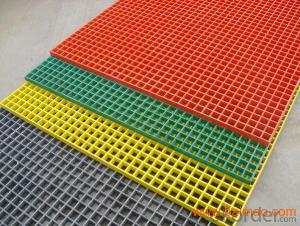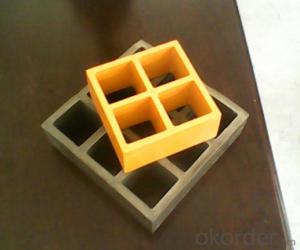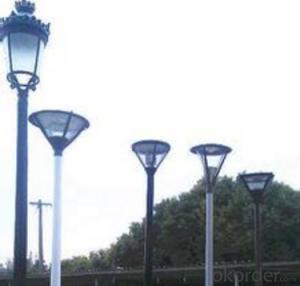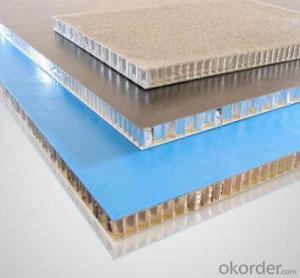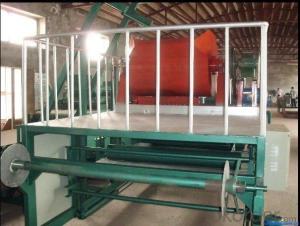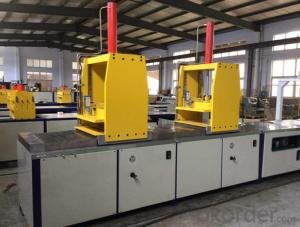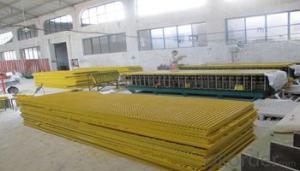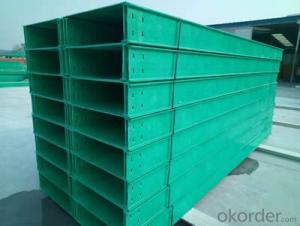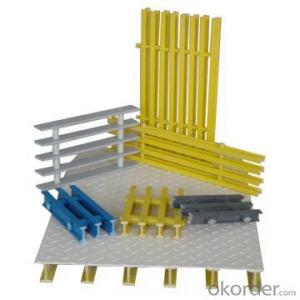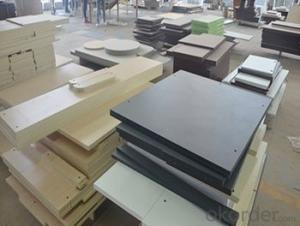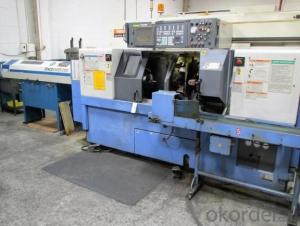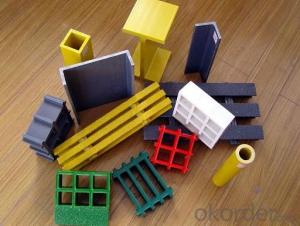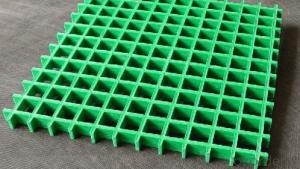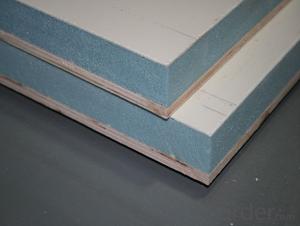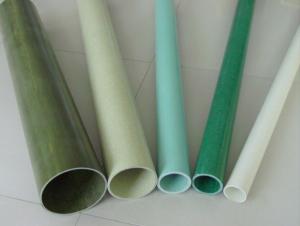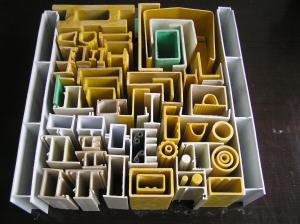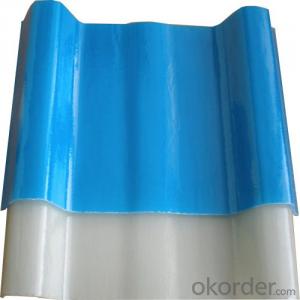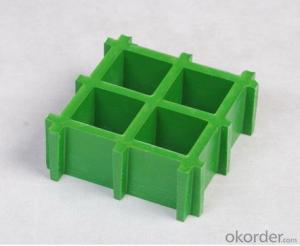FRP Pultrusion Profiles - Pultruded Grating Easy Maintenance
- Loading Port:
- Tianjin
- Payment Terms:
- TT OR LC
- Min Order Qty:
- 4000 m.t.
- Supply Capability:
- 100000 m.t./month
OKorder Service Pledge
OKorder Financial Service
You Might Also Like
Specification
PRODUCT DESCRIPTION
Pultruded grating is made by a par ticular assembly process, which using “I” shape as its main load-bearing and special rod to go through the bearing bar. Pultruded grating include the standard grating and the custom grating, the custom grating can be designed to meet customer’s requirement or special using condition by changing the shape, size and space of the bearing bars, the sur face can be covered with lozenge panel, grit panel, or added the anti-slippery sand directly.
FRP pultruded grating has the most characteristics of molded grating, but it has its distinct advantages, it has very high fiberglass content in the loading direction, so it has very high load capability, it has more superiority when used at wide span, so that the basic support will be decreased and the project cost will be reduced accordingly.
SPECIFICATION
The standard space between two crossbars is 6 inch or 12 inch.
Thickness (mm) | Bar width (mm) | Open space (mm) | Open rate (%) | Approx weight (kg/m |
25.4 | 15.2 | 22.8 | 60 | 13.2 |
25.4 | 15.2 | 15.2 | 50 | 15.9 |
25.4 | 15.2 | 10.1 | 40 | 18.5 |
25.4 | 40 | 10.8 | 21 | 14.5 |
38.1 | 15.2 | 22.8 | 60 | 15.8 |
38.1 | 15.2 | 15.2 | 50 | 19.1 |
FEATURES
a. Anti-corrosion and anti-rust
b. Light weight and high strength
c. Anti-flammable
d. Anti- fatigue
e. Safe and anti-slippery
f. Anti-ageing
g. Easy of maintenance
h. Excellent electromagnetism property
i. Good economic benefit
FIELDS SERVED
Sewage treatment,
water supply and drainage,
chemical industry,
oil industry,
power engineering,
APPLICATION
Operation terrace,
stair walkway,
ground floor,
trench cover,
sidewalk,
foot bridge,
equipment safety fence,
scaffold.
COMPANT DESCRIPTION
CNBM,China National Building Materials Group is a state-owned enterprise in charge of administrative affairs in china building materials industry. Established in 1984, CNBM is a large group corporation of building materials with total assets of 25 billion RMB and a total staff of 30,000.CNBM now owns 200 subordinating firms of solely owned and joint-venture companies.
CNBM International Corporation is one subsidiary of CNBM, we focus on offering good-quality products,professional service and complete solution to our customers. Strong delivery capacity, advanced technology& management, strong financing capability and excellent after-sale service are our advantages in sharing international market.
PACKAGING & DELIVERY
1.PACKAGING DETAILS:
standard packing or your requirement
2.DELIVERY DETAIL:
Shipped in 30 days after payment
FAQ
1.Q:Are you factory or trading company ?
A:We are Factory produce FRP machines and FRP products.
2.Q:If can customized by customers requirements?
A:yes,we can produce the machine with customized size.
3.Q:How about the payment?
A:We accept any kind of payment.
4.Q:What is the guarantee?
A:Gurantee is one year.
5.Q:If you can training?
A:yes ,we can training in our factory also can send engineers to your factory training.
PICTURES
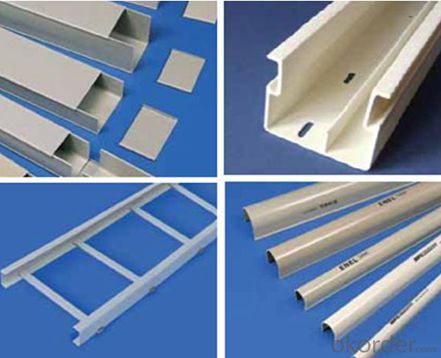
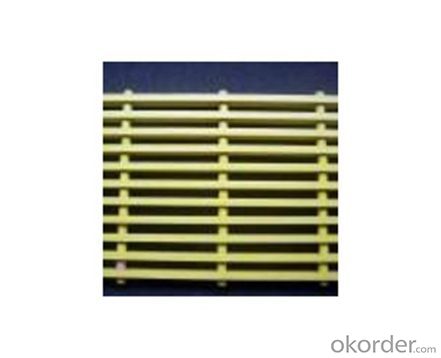
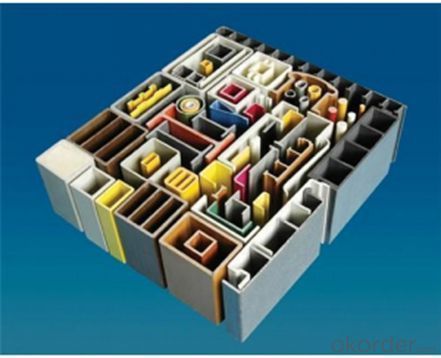
- Q: How do FRP pultrusion profiles handle cyclic loading?
- FRP pultrusion profiles are known for their excellent performance under cyclic loading conditions. The unique combination of materials and manufacturing process used in pultrusion makes these profiles highly resistant to fatigue and cyclic loading effects. One key factor that contributes to the superior performance of FRP pultrusion profiles under cyclic loading is their inherent high strength-to-weight ratio. These profiles are made using continuous fibers, typically fiberglass, which are impregnated with a resin matrix. This results in a lightweight yet strong material that can handle repeated loading without experiencing significant degradation or fatigue. Additionally, the pultrusion process allows for precise control over the fiber orientation and resin distribution within the profile. This results in a uniform and consistent material composition throughout the entire length of the profile. As a result, FRP pultrusion profiles exhibit excellent load distribution characteristics, minimizing stress concentrations and preventing localized failure under cyclic loading conditions. Furthermore, the corrosion resistance of FRP pultrusion profiles plays a crucial role in their ability to handle cyclic loading. Unlike traditional materials such as steel, FRP profiles do not suffer from corrosion-related issues, such as rust or pitting. This corrosion resistance ensures that the profiles maintain their structural integrity even when subjected to cyclic loading over extended periods of time. Overall, FRP pultrusion profiles are specifically designed and manufactured to withstand cyclic loading conditions. Their high strength-to-weight ratio, uniform material composition, and corrosion resistance make them ideal for applications where cyclic loading is a significant factor. Whether it's in structural reinforcements, bridges, sporting equipment, or various industrial applications, FRP pultrusion profiles have proven to be reliable and durable under cyclic loading.
- Q: Can FRP pultrusion profiles be used in water treatment plants?
- Yes, FRP pultrusion profiles can be used in water treatment plants. FRP (Fiber-Reinforced Polymer) is a corrosion-resistant material that is well-suited for water treatment applications. It is lightweight, durable, and has excellent chemical resistance properties, making it ideal for use in environments with exposure to water and various chemicals. Additionally, FRP pultrusion profiles offer design flexibility and can be customized to meet specific project requirements.
- Q: Can FRP pultrusion profiles be used in telecommunications applications?
- Telecommunications applications can utilize FRP pultrusion profiles, which offer a range of advantages that render them suitable for such infrastructure. To begin with, these profiles possess the desirable combination of being lightweight and strong, making them an excellent choice for supporting antennas, cable trays, and equipment racks. Their high strength-to-weight ratio enables easier installation and transportation while providing the necessary structural support. Moreover, FRP pultrusion profiles display corrosion resistance, a crucial characteristic for telecommunications applications. Given the exposure of telecommunications infrastructure to harsh environments like moisture, chemicals, and extreme temperatures, FRP's non-corrosive properties guarantee long-term durability and reliability, distinguishing it from traditional materials such as steel or wood. Additionally, FRP pultrusion profiles offer electrical insulation properties, which are vital in telecommunications applications. By not conducting electricity, they ensure safety in areas where electrical equipment is present. This feature prevents electrical interference and preserves the integrity of the telecommunications system. Furthermore, FRP pultrusion profiles can be customized to meet specific design requirements, as they can be manufactured in various shapes and sizes. This flexibility allows for the efficient design of telecommunications infrastructure, making FRP pultrusion profiles suitable for a wide range of applications within the industry. In conclusion, FRP pultrusion profiles prove to be well-suited for telecommunications applications due to their lightweight yet strong nature, corrosion resistance, electrical insulation properties, and customization possibilities. These attributes guarantee their reliability in supporting and protecting telecommunications infrastructure.
- Q: Can FRP pultrusion profiles be used in the construction of pedestrian bridges?
- Yes, FRP pultrusion profiles can be used in the construction of pedestrian bridges. FRP pultrusion profiles offer several advantages such as high strength, corrosion resistance, low maintenance, and lightweight properties, making them suitable for pedestrian bridge applications. Additionally, the flexibility in design and customization options of FRP pultrusion profiles allows for efficient construction and installation of pedestrian bridges.
- Q: Are FRP pultrusion profiles resistant to chemicals used in semiconductor manufacturing?
- Yes, FRP (Fiber Reinforced Plastic) pultrusion profiles are generally resistant to the chemicals used in semiconductor manufacturing. FRP is known for its excellent chemical resistance, making it a suitable material for various industrial applications, including the semiconductor industry. The composite structure of FRP, consisting of a reinforced fiber matrix embedded in a polymer resin, provides resistance to a wide range of chemicals, including acids, alkalis, solvents, and other aggressive substances commonly used in semiconductor manufacturing processes. This resistance ensures that FRP pultrusion profiles can withstand exposure to these chemicals without significant degradation or corrosion, making them a reliable choice for use in semiconductor manufacturing environments. However, it is always advisable to consult the specific chemical resistance data provided by the manufacturer to ensure compatibility with the exact chemicals and concentrations used in a particular semiconductor manufacturing process.
- Q: What is the compression strength of FRP pultrusion profiles?
- The compression strength of FRP pultrusion profiles can vary due to several factors, including the type of resin, fiber orientation, and design. However, on average, the compression strength of these profiles ranges from 10,000 to 50,000 psi. It is worth mentioning that these values are approximate and may differ depending on the specific application and intended use of the FRP profiles. Moreover, manufacturers usually offer technical data sheets that detail the compression strength and other mechanical properties of their FRP pultrusion products. These sheets can be used to obtain more precise and dependable information.
- Q: Are FRP pultrusion profiles resistant to fading or discoloration?
- FRP pultrusion profiles possess exceptional resistance against fading and discoloration. This attribute stems from the inherent properties of the materials employed in their construction. Typically, FRP profiles are fabricated using a blend of fiberglass reinforcements and a polymer resin matrix, both of which inherently resist UV radiation and other environmental factors that lead to fading and discoloration. The polymer resin matrix used in FRP profiles is specifically designed to exhibit outstanding chemical resistance and UV stability. As a result, the profiles retain their original color and appearance for an extended duration. This makes FRP pultrusion profiles an ideal choice for outdoor applications, where exposure to sunlight and harsh weather conditions is prevalent. Additionally, the pultrusion manufacturing process ensures that the color of FRP profiles remains consistent throughout their entire cross-section. Consequently, even in the presence of minor surface damage or wear, the underlying color of the profile remains unchanged, ensuring a uniform appearance. In summary, FRP pultrusion profiles offer unparalleled resistance against fading and discoloration, making them a resilient and long-lasting option for a wide range of applications, including construction, infrastructure, transportation, and more.
- Q: Can FRP pultrusion profiles be used in the construction of highway guardrails?
- Yes, FRP pultrusion profiles can be used in the construction of highway guardrails. FRP (Fiber Reinforced Polymer) pultrusion profiles offer excellent strength-to-weight ratio, corrosion resistance, and durability, making them a suitable choice for guardrails. They are lightweight, easy to install, and require minimal maintenance, making them cost-effective in the long run. Additionally, FRP profiles can be molded into various shapes and sizes to meet specific design requirements, ensuring the safety and effectiveness of the highway guardrails.
- Q: Can FRP pultrusion profiles be used in electrical insulation applications?
- Yes, FRP pultrusion profiles can be used in electrical insulation applications. FRP (Fiber Reinforced Polymer) materials have excellent electrical insulation properties, making them suitable for a wide range of electrical applications. The pultrusion process ensures that the profiles have uniform insulation properties and high strength, making them ideal for use in electrical insulation applications.
- Q: Can FRP pultrusion profiles be used in the construction of agricultural structures?
- Yes, FRP (Fiber Reinforced Polymer) pultrusion profiles can be used in the construction of agricultural structures. FRP pultrusion profiles offer several advantages that make them suitable for agricultural applications. Firstly, FRP pultrusion profiles are lightweight yet strong, making them ideal for constructing agricultural structures such as greenhouses, barns, and storage facilities. Their high strength-to-weight ratio allows for easy installation and reduces the overall weight of the structure, thereby minimizing the need for heavy machinery during construction. Secondly, FRP pultrusion profiles are corrosion-resistant, which is a crucial characteristic for agricultural structures that are exposed to various environmental elements such as moisture, chemicals, and fertilizers. Unlike traditional materials like wood or steel, FRP does not rot, rust, or corrode, ensuring the longevity and durability of the agricultural structure. Additionally, FRP pultrusion profiles offer excellent electrical insulation properties. This is particularly beneficial in agricultural applications where electrical equipment, such as lighting systems or ventilation controls, are commonly used. The non-conductive nature of FRP prevents the risk of electrical shocks or short circuits. Moreover, FRP pultrusion profiles are highly customizable and can be designed to meet specific requirements. This flexibility allows for the creation of structures that are tailored to the unique needs of agricultural operations, such as load-bearing capacity, dimensional accuracy, and thermal insulation. Furthermore, FRP pultrusion profiles are non-magnetic, making them suitable for use in agricultural structures where magnetic interference can disrupt sensitive equipment or affect the growth of crops. Overall, the use of FRP pultrusion profiles in the construction of agricultural structures offers numerous benefits, including lightweight construction, corrosion resistance, electrical insulation, customization options, and non-magnetic properties. These advantages make FRP pultrusion profiles a viable and practical choice for agricultural applications.
Send your message to us
FRP Pultrusion Profiles - Pultruded Grating Easy Maintenance
- Loading Port:
- Tianjin
- Payment Terms:
- TT OR LC
- Min Order Qty:
- 4000 m.t.
- Supply Capability:
- 100000 m.t./month
OKorder Service Pledge
OKorder Financial Service
Similar products
Hot products
Hot Searches
Related keywords
